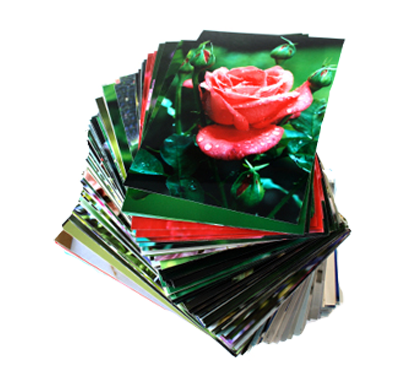
TIFF stands for Tagged Image File Format and is a format for storing images. It is popular with graphic artists and the publishing industry and is often preferred to its rival format JPEG (aka JPG) because of a perceived higher quality image.
However, this higher quality of image comes at a price - file size! To get the best quality image you would normally save the image as an uncompressed TIFF file, but a 1200 DPI scan of photo that creates a file size of 18MB in JPEG will create the same file as 105MB in TIFF.
DPIDots per inch is the term used to measure the density of an image, namely the number of dots that can be placed in a line within 1 inch (2.54cm). The higher the DPI used to scan an image, the larger the resulting file will be. Most photographs are printed at 300 DPI, and so scanning at a higher resolution wont improve the quality of the image, however if you intend to print enlargements using a photo printing website it will be better to scan your photo's at a higher resolution and send them the high resolution file. Some web sites will enlarge the print using low quality software, so the more you can do to minimize the changes your printers need to do the better.
JPG JPEG files are the most commonly used method of storing photographs on computers and digital cameras. Photo's scanned to JPEG files do produce excellent results whilst taking up a minimum of space, and achieves this by compressing your images, which results in a loss of quality. However, the JPEG standard allows for different levels of compression, with higher quality scans resulting the less you compress the image. By default, Pixave scan your photographs in JPEG format with the least level of compression, resulting in high quality images that are reasonably large in size. The quality will outstanding and will look fantastic for everyday use such as reprinting your family photographs etc. There are some applications that require a higher quality, e.g. images to be printed in magazines, where professionals require the highest quality possible, in which case, we are happy to scan your photographs in TIFF format which are lossless (i.e. have no compression) but take up HUGE amounts of disk space.
TIFTagged Image File Format (TIFF) files are commonly used to store images within the publishing industry, graphic artists and professional photographers. TIFF files produce a better quality image when compared to JPEG files, because the images are not compressed, however they take significantly more space on your hard drive, e.g. a 1200 DPI scan of a transparency that creates an image sized 5267 * 6899 pixels is 18.2MB in JPEG format but 105.2MB in TIFF format. As you can see from these figures, the JPEG format has removed 80MB of the same image, and therefore it is logical to assume that the TIFF file is of higher quality, however this is a very subjective area as a lot of people cannot tell the difference, and the cost of storing TIFF files compared to JPEG on your systems can be a lot higher simply due amount of disk space required.
Pixave are happy to scan your photographs in your choice of resolution file format (JPEG / TIFF) at no extra cost. By default your photograhps will be scanned at 600 DPI into JPEG format, if you have different requirements please let us know in the special instructions of our order page or when you speak to us on the phone.
We'll scan any photo, at any resolution, in either JPEG or TIFF format for £0.09p per photo. The only restriction is that photo must be upto A4 size.
Photo scanning pricesYou can of course contact us or use our online system to get a quote and place an order, then just send your photo's to us. We will take great care of your photos.
How photo scanning worksWant to share your photos with your children ? Or are you having a wedding, perhaps a big birthday coming up and want to embarrass the lucky person ?
Why scan your photos?Share your scanned images with the world through social media such as Facebook, Twitter, Flickr, Dropbox etc and let the world enjoy!
Sharing photos on social media